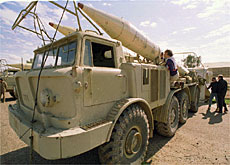Iraq and terrorism top agenda in Montreux

Around 500 military and humanitarian experts are gathering in Montreux this week for the sixth annual International Security Forum (ISF).
The war on terror and the hunt for weapons of mass destruction are just two of the issues to be discussed at the meeting, which got underway on Monday.
Speaking at the gathering on Monday, Hans Blix, the former United Nations weapons inspector for Iraq, strongly criticised the United States-led invasion of Irag.
“It is clear that the occupation of Iraq has fuelled terrorism and that illegitimate military action, in this case as in others, breeds further terrorist acts,” he said.
Blix, who led the UN weapons inspection team until March 2003, also condemned the Bush administration for using WMD as an excuse for launching a pre-emptive strike on Iraq.
A broad range of other topics – from human security and the small-arms trade to sustainable development and natural disasters – are also on the forum’s agenda.
Hosted by the Swiss foreign and defence ministries, the three-day conference forms part of Switzerland’s contribution to Nato’s Partnership for Peace.
“This is a unique opportunity for actors from many different fields to exchange opinions and analysis,” said Jacques-Henri Addor of the Swiss defence ministry.
“Switzerland is a country that specialises in promoting and building peace,” he told swissinfo. “So this conference really fits in with that role.”
Unique exchange
Addor’s comments were echoed by Theodor Winkler, head of the Geneva Centre for the Democratic Control of Armed Forces (DCAF), which was charged by the Swiss government with organising this year’s event.
“In a world confronted with complex challenges, it is crucial to be able to compare notes across multiple dividing lines and come up with complex and workable answers,” said Winkler.
“Here, military chiefs mingle with humanitarian experts, and politicians talk to academics… so the unique aspect of this gathering is its multifaceted approach to finding solutions.”
Policymakers, researchers and development experts, including Walter Fust, head of the Swiss Agency for Development and Cooperation, are scheduled to take part in the talks.
Serbian President, Boris Tadic, and Amr Moussa, secretary-general of the Arab League, are also slated to attend.
Al-Qaeda
One of the burning issues participants are expected to tackle this week is the war in Iraq.
Rohan Gunaratna, a leading terrorism expert from Singapore, is expected to address whether the war in Iraq has caused al-Qaeda’s ranks to swell.
His speech is set to focus on the changing face of al-Qaeda, and whether military action tends to deter or escalate terrorist violence.
Participants are also due to discuss the impact of terrorism – from Baghdad to Beslan – and the threat of biological weapons.
“It is unimaginable when we think about the speed and intensity with which the world has changed since this forum was created in 1994,” said Addor.
“Federal governments must protect their citizens and ensure their security,” he added.
“And Switzerland is proud to be a leader in fostering international dialogue on human security issues.”
swissinfo, Anna Nelson in Geneva
The ISF, which takes place every two years, was created in 1994.
Since then, the number of participants has more than doubled to around 500 this year.
The event alternates between the Zurich and Geneva areas.
The ISF is hosted by the Swiss foreign and defence ministries, and aims to foster dialogue and cooperation on global security issues.
The conference brings together military, academic and humanitarian experts to discuss a broad range of topics from terrorism to natural disasters.
This year’s event is taking place in the lakeside town of Montreux, near Geneva.
A slew of organisations and institutions, including the Federal Institute of Technology in Zurich and the International Committee of the Red Cross, are partners to the forum.

In compliance with the JTI standards
More: SWI swissinfo.ch certified by the Journalism Trust Initiative











You can find an overview of ongoing debates with our journalists here . Please join us!
If you want to start a conversation about a topic raised in this article or want to report factual errors, email us at english@swissinfo.ch.